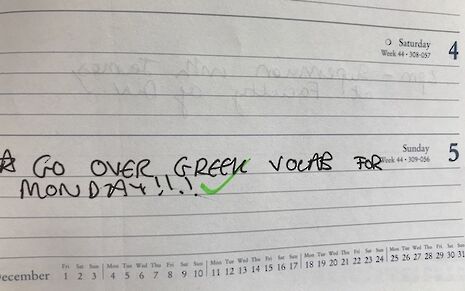
It’s all Greek to me…
Violet’s Lily Ford gives her top tips for picking up a scriptural language in first year

Confession time: I did not give my course outline one glance before applying to Cambridge. It was only in preparation for my interview that I was struck with the thought that I should probably give it a little look over if I wanted to, you know, actually be able to discuss religion and all that with my interviewer. Thankfully, I liked what I saw, and I don't know what it was – most likely the powerful combination of innocent naivety and the delirious excitement of telling people yeah, I've applied to Cambridge #nobigdeal – but I seemed to completely neglect the fact I was required to pick up a scriptural language in first year.
There are four options for first year Theologians – New Testament Greek, Qur'anic Arabic, Sanskrit, and Hebrew. A tempting menu, right? A first meeting with a supervisor in October last term sums up my thinking here: when asked as to why we chose to study Greek, my friend replied stating her charming interest in the origins of the Bible. My answer was more along the lines of "I heard it was the easiest."
A little daunted, there was still a small, unsuspecting sense of hope that absolutely any desirable technique I had acquired from GCSE German would pull through. I was worried and unconvinced that a description of the items in my pencil case would be of any use in the forthcoming task.
I'd be lying to you if I said I, myself had stuck to the following tips, but they are what I would recommend to anyone else about to board the ancient language train.
Having said that, the bare minimum seemed to be a level I was happy to work at which, as I write this now, feels a little worrying and I'm kind of hoping my Mum doesn't read this.
1.) Make a summer start
This isn't as simple as a modern language – it's a new alphabet and a different way of writing in general. You'll thank yourself later if you jump on the bus early and become familiar with the alphabet, at least. I told myself I would reach chapter four by the beginning of term but obviously, this never happened. Imagine the panic when turning up to an introductory lecture and hearing the room speak fluent Greek in perfect unison. False alarm: I wasn't alone in my meltdown, and those speaking Greek were postgrads who were well acquainted with the language. The alphabet was probably sufficient if, like me, you are not a natural linguist. Yes, I am in the bottom Greek set.
2.) Don't panic!
In reference to the story above, it may feel a little terrifying when you first start learning the language. I persuaded myself that this Greek paper was going to be my downfall and was beside myself wondering how I was going to explain to people that I'd been kicked out of Cambridge, especially after I'd already changed my cover photo on Facebook to a matriculation photo (umm embarrassing!!) Then I actually attended the first few lectures and sorted my attitude out a bit – think positive – and I heaved a huge sigh of relief.
3.) Keep caught up

Sheer fear of falling behind drove a strange resilience to never miss a lecture in Michaelmas term. I still missed two (lol) but even so, tried to find out what I missed and learn the vocab for each chapter. This really helped, not only for the sake of my progress but also with not feeling completely swamped and stressed out.
4.) Vocab is vital!
You could know everything else about the scriptural language you're studying, but an unfamiliarity with the vocab will leave you lost. I cherished the post-food and booze laze in the Christmas holidays and took this time to go over all of the vocab from Michaelmas term, and cannot overstate how useful this was coming back in Lent. It will be hard work, but grab a flashcard or a mini whiteboard and marker pen – so, so helpful - and get going.
5.) Don't suffer in silence
If your class is going too fast, try asking the teacher for a word or even consider moving down a set. Thankfully, my teacher is an actual angel sent from heaven and would be willing to help wherever possible, but even if she wasn't, I would find a way to make life easier. Ancient languages are hard! That's why no one speaks them anymore! (Ok, obviously Arabic and Hebrew are still spoken, but New Testament Greek? Come on.) Just really give it your best shot and don't lose faith if you're struggling – it's an uphill battle, but step up to the scriptural challenge.


